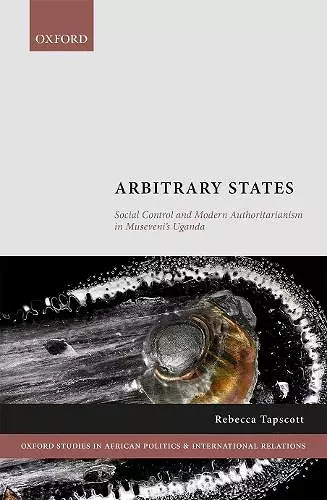Arbitrary States
Social Control and Modern Authoritarianism in Museveni's Uganda
Format:Hardback
Publisher:Oxford University Press
Published:1st Jul '21
Currently unavailable, and unfortunately no date known when it will be back

In recent years, scholars have noted the rise of a particular type of authoritarianism worldwide, in which rulers manipulate institutions designed to implement the rule of law so that they instead facilitate the exercise of arbitrary power. Even as scholars puzzle over this seemingly new phenomenon, scholarship on African politics offers helpful answers. This book places literature on the post-colonial African state in conversation with literature on modern authoritarianism, using this to frame over ten months of qualitative field research on Uganda's informal security actors - including vigilante groups, local militias, and community police. Based on this research, the book presents an original framework - called 'institutionalized arbitrariness' - to explain how modern authoritarian rulers project arbitrary power even in environments of relatively functional state institutions, checks and balances and the rule of law. In regimes characterized by institutionalized arbitrariness, the state's stochastic assertions and withdrawals of power inject unpredictability into the political relationship between both local authorities and citizens. This arrangement makes it difficult for citizens to predict which authority, if any, will claim jurisdiction in a given scenario, and what rules will apply. This environment of pervasive political unpredictability limits space for collective action and political claim-making, while keeping citizens marginally engaged in the democratic process. The book is grounded in empirical research and literature theorizing the African state, while seeking to inform a broader debate about contemporary forms of authoritarianism, state-building, and state consolidation. Oxford Studies in African Politics and International Relations is a series for scholars and students working on African politics and International Relations and related disciplines. Volumes concentrate on contemporary developments in African political science, political economy, and International Relations, such as electoral politics, democratization, decentralization, gender and political representation, the political impact of natural resources, the dynamics and consequences of conflict, comparative political thought, and the nature of the continent's engagement with the East and West. Comparative and mixed methods work is particularly encouraged, as is interdisciplinary research and work that considers ethical issues relating to the study of Africa. Case studies are welcomed but should demonstrate the broader theoretical and empirical implications of the study and its wider relevance to contemporary debates. The focus of the series is on sub-Saharan Africa, although proposals that explain how the...
a great example of a book in which the reader is treated to a convincing case study that is connected - in a surefooted way - to wider themes... It is the ability to see the systemic nature of apparently chaotic forms of governance that makes this an important book...There is no doubting that scholars, practitioners and policymakers will be using this book in attempting to understand forms of authoritarianism that have a tensile strength that they draw from subtle flexibilities. * Roger Mac Ginty, Civil Wars *
One of the great strengths of Arbitrary States lies in its engagement with community perceptions of arbitrary governance. Tapscott does an excellent job of engaging her detailed fieldwork and extensive interviews to substantiate her theoretical claims...[a] thoughtful and engaging book. * Cyanne E. Loyle, Perspectives on Politics *
Tapscott's analysis strikingly underlines the truism that, in authoritarian states, the army and the police serve the regime, not the public. * Nicolas van de Walle, Foreign Affairs *
Tapscott's brilliant concept of institutionalized arbitrariness forces students of state formation to reconsider theoretical first principles by positing that uncertainty functions as a defining strategy of modern authoritarian rule. She banishes the ubiquitous dichotomies of strong-weak, formal-informal, and rational-patrimonial in favour of a sophisticated model of state-citizen relations that are mediated by unpredictability and confusion. Drawing on rich qualitative research, Tapscott centres African politics, not as a site of exotic dysfunction, but as a means of revealing larger truths about how regimes across the world (mis)manage violence in terms that afford them remarkable agility and reach. In so doing, she makes a marvellous contribution to the study of modern governance. * Dipali Mukhopadhyay, Associate Professor of Global Policy, University of Minnesota *
Arbitrary States is a deeply fascinating study that advances an original and important argument about present-day Uganda. Tapscott convincingly shows how the Museveni regime uses unpredictability as a mode of governance, leading citizens to self-police in the face of uncertainty and institutionalized arbitrariness. Fascinating in its empirical richness and impressive in its analytical reach, Arbitrary States is a must read for anyone interested in contemporary authoritarianism in Africa and beyond. * Rita Abrahamsen, Professor in the Graduate School of Public and International Affairs and Director of the Centre for International Policy Studies, University of Ottawa *
This book is a brilliant exposition of institutionalized arbitrariness in Ugandan politics. Its insights help us better understand modern authoritarian rule, neopatrimonialism, and how the state reproduces its authority on a day-to-day basis. This masterpiece is a must read for scholars of contemporary African politics. * Aili Mari Tripp, Wangari Maathai Professor of Political Science and Gender and Women's Studies, University of Wisconsin-Madison *
Rebecca Tapscott's book is ground-breaking and compelling. It aptly describes the contours of state power in Uganda under Museveni while also providing a fine-grained theoretical framework with implications beyond Uganda...and provides a new way of understanding the institutional contours of Museveni's long rule. It draws on extensive and original field research. Ugandan politics specialists, as well as scholars of comparative politics, will find this book very useful in making sense of one of the most important puzzles in our field-how to manage centralised use of violence. * Moses Khisa, Journal of Development Studies *
Arbitrary States is a compelling book. It draws on extensive and original field research. It is well-written and provides a new way of understanding the institutional contours of Museveni's long rule. * Moses Khisa, North Carolina State University *
ISBN: 9780198856474
Dimensions: 242mm x 159mm x 20mm
Weight: 532g
256 pages